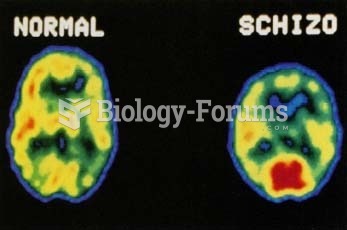Answer to Question 1
Correct Answer: 1
Rationale 1: A main theory of schizophrenia is that the brain produces too much dopamine. Antipsychotic drugs act by attaching to dopamine receptors in the postsynaptic neurons of the brain. This prevents dopamine from attaching to and stimulating the receptors. Thus, psychotic behavior is reduced when the dopamine receptors are blocked by antipsychotic drugs.
Rationale 2: Client will have improved sleep patterns is incorrect because an improvement in sleep patterns is not directly related to a reduction in dopamine. However, sleep patterns might improve when the psychotic behavior is reduced.
Rationale 3: Client will decrease anxiety is incorrect because a decrease in anxiety is not directly related to a reduction in dopamine. However, anxiety might be decreased when the psychotic behavior is reduced.
Rationale 4: Client will improve social relationships is incorrect because dopamine reduction by itself does not improve social relationships. A client needs therapy to improve social relationships.
Global Rationale: A main theory of schizophrenia is that the brain produces too much dopamine. Antipsychotic drugs act by attaching to dopamine receptors in the postsynaptic neurons of the brain. This prevents dopamine from attaching to and stimulating the receptors. Thus, psychotic behavior is reduced when the dopamine receptors are blocked by antipsychotic drugs. Client will have improved sleep patterns is incorrect because an improvement in sleep patterns is not directly related to a reduction in dopamine. However, sleep patterns might improve when the psychotic behavior is reduced. Client will decrease anxiety is incorrect because a decrease in anxiety is not directly related to a reduction in dopamine. However, anxiety might be decreased when the psychotic behavior is reduced. Client will improve social relationships is incorrect because dopamine reduction by itself does not improve social relationships. A client needs therapy to improve social relationships.
Answer to Question 2
Correct Answer: 3
Rationale 1: Risperdal has a small amount of drug released in 1 day and the rest after 3 weeks, and lasts 46 weeks.
Rationale 2: Risperdal has a small amount of drug released in 1 day and the rest after 3 weeks, and lasts 46 weeks.
Rationale 3: Risperdal has a small amount of drug released in 1 day and the rest after 3 weeks, and lasts 46 weeks.
Rationale 4: This is the amount of time for the onset of oral Risperdal.
Global Rationale: Risperdal has a small amount of drug released in 1 day and the rest after 3 weeks, and lasts 46 weeks. All the other answer choices are incorrect.







